It's easy to see Vietnamese restaurants in Taipei, most of which are opened by overseas Chinese or Taiwanese citizens. It's rarer to find Vietnamese restaurants run by so-called "Vietnamese brides," who are often perceived to be poor, badly educated and abused women.
But Nguyen Diem-quyen's (
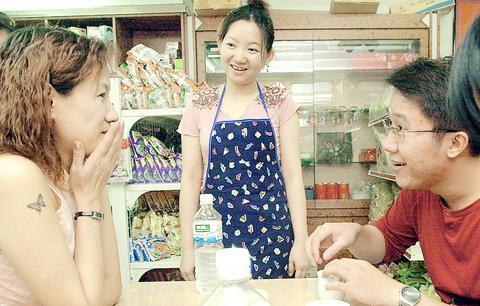
PHOTO: CHIANG YING-YING, TAIPEI TIMES
Located in Shihlin, Diem Quyen has an eye-catching, red signboard hanging near Chihshan MRT station. The Vietnamese language on the board distinguishes the shop from the other neighboring shops. The left hand side of the store carries groceries, including Vietnamese or Thai-style instant noodles, fish sauces, shrimp pastes, chilli sauces, dry rice noodles, Vietnamese spring roll wraps, Indonesian Pecel sauce, palm sugar and Tamarid paste. There are also exotic drinks, such as pineapple juice and bird's nest.
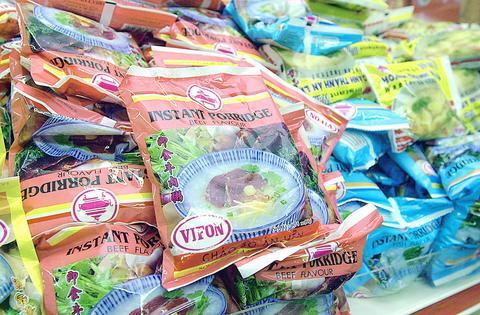
PHOTO: CHIANG YING-YING, TAIPEI TIMES
It was lunch time on Thursday, when Li Mei-tsao (黎梅草), a
Vietnamese bride, brought her 18-month-old twin sons to the shop. She said in accented Mandarin that she has been married to a Taiwanese for three years. Every other day, she visits the shop, coming from Kuandu on her scooter, along with a friend, also a Vietnamese bride, and her two sons. Her routine is the same: She eats a bowl of home-style rice noodles and chats with friends, before going home.
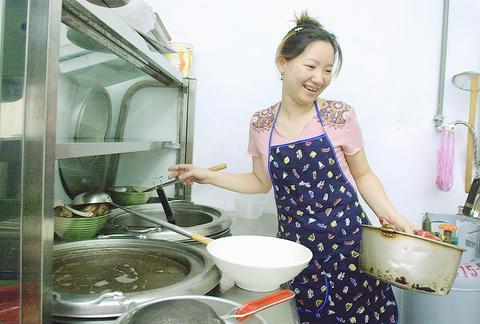
PHOTO: CHIANG YING-YING, TAIPEI TIMES
A few minutes later, Yang Ching-chen (楊清貞), another Vietnamese bride, brought her two-year old daughter to the shop. She said she waited at the store for her husband to pick her up and take her to classes that have been organized by a women's group and commissioned by Taipei City Government, in order to get brides used to Taiwan and its customs.
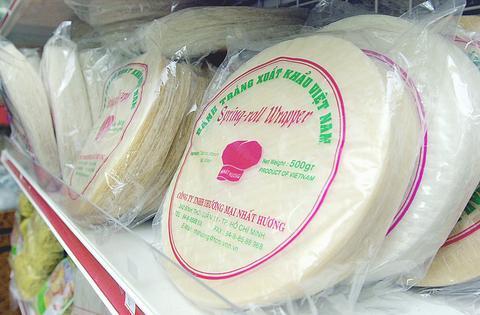
PHOTO: CHIANG YING-YING, TAIPEI TIMES
"In class, we learn Mandarin, make-up, manicure and cooking," Yang said, as she gulped down red-hot spicy soup noodles. Meanwhile, her daughter played with the twin boys, grabbing a pack of peanuts and throwing them at each other. The small store soon became a kid's playground.
"Three years ago, when I started helping other Vietnamese brides, I found that there was a big demand to bring goods, food, seasonings and drinks from home, to quench the thirsts of the homesick," Nguyen said, with a smile on her round face.
"In Taipei, we are the only store where you can find genuine Vietnamese goods and enjoy authentic Vietnamese food," said Fang Tse (
Maybe because Nguyen's marriage was based on romance rather than being a financial arrangement, she has become accustomed to Taiwan. "I was given more freedom in my life in Taiwan, compared with many other Vietnamese brides," she said.
Three years ago, Nguyen began joining aid programs to help Vietnamese brides who suffer from domestic violence, marriage problems or language difficulties. "Most of the time I'm the mediator, translating between the husband and wife. I will let them communicate between themselves first. And when they find a problem, I jump in to help. Sometimes I give advice. Mostly I try to make peace and prevent them from splitting up," Nguyen said.
Many of these brides become loyal customers at the shop. "We are not like the Filipinos who meet each other every week at church. Being Buddhists, Vietnamese brides in Taiwan don't have religious gatherings to meet each other."
During Chinese New Year, Nguyen said she held a Vietnamese-style year-end party and invited dozens of couples to enjoy Vietnamese barbecue and card games.
Nguyen's menu is inexpensive. A big bowl of noodles costs only NT$80. The French baguette sandwich with beef, or Vietnamese sausages, are the same price. There are also small delicacies like curry shrimp cakes and Vietnamese duck eggs.
"80 percent of our guests are foreigners and 90 percent of them are Vietnamese. There are some Japanese and Americans," Nguyen's husband Fang said.
Nguyen said some Vietnamese brides come to the shop without telling their husband or mother-in-law. "[This is because] the mother-in-law does not want the bride to make new friends or chat with fellow nationals." Their worry is that the woman will compare their situation with others and become dissatisfied.
"I'm telling you. Those marriages based on money, 80 percent out of them end up with problems or constant quarrels," Fang said. "The woman is afraid of her husband abusing her; and the man is afraid that the wife is ripping him off. The biggest issue is always money," he said.
"What makes it worse is that after the media reported on cases of Vietnamese brides being abused with violence, the brides become more frightened. And then they become more defensive with their husbands, thus creating more tension," Nguyen said.
"The other day a Taiwanese man who had a foreign bride committed suicide by jumping off a building. I heard the reason was because of money," Fang added.
Fang met Nguyen during a trip to Vietnam. "Looking back, it was a persistent pursuit, almost silly," Fang said.
When he returned to Taiwan, he corresponded with his future wife, who said it was the sincerity and honesty of Fang's letters that touched her heart.
"Trying to get used to life in Taiwan is a way to smooth the difficulties after marriage. You just have to match up with the customs and lifestyles and try not to be so different. I wouldn't always think `I'm Vietnamese,'" Nguyen said.
Having opened the shop for a year-and-a-half, Fang and Nguyen said they just managed to earn enough to make a living for themselves and their seven year-old son.
"I hope that one day we are able to take charge of the import trade for the shop and choose our own goods to be imported from Vietnam," Nguyen said.
"I also hope that one day Vietnam will not be a poor country anymore, so that there will be less uneducated families asking their daughters to marry a Taiwanese, just for the money."
For your information: Nguyen Diem-quyen's shop is at: 132, Fuhua Rd, Shihlin, Taipei (

April 28 to May 4 During the Japanese colonial era, a city’s “first” high school typically served Japanese students, while Taiwanese attended the “second” high school. Only in Taichung was this reversed. That’s because when Taichung First High School opened its doors on May 1, 1915 to serve Taiwanese students who were previously barred from secondary education, it was the only high school in town. Former principal Hideo Azukisawa threatened to quit when the government in 1922 attempted to transfer the “first” designation to a new local high school for Japanese students, leading to this unusual situation. Prior to the Taichung First

Chinese Nationalist Party (KMT) Chairman Eric Chu (朱立倫) hatched a bold plan to charge forward and seize the initiative when he held a protest in front of the Taipei City Prosecutors’ Office. Though risky, because illegal, its success would help tackle at least six problems facing both himself and the KMT. What he did not see coming was Taipei Mayor Chiang Wan-an (將萬安) tripping him up out of the gate. In spite of Chu being the most consequential and successful KMT chairman since the early 2010s — arguably saving the party from financial ruin and restoring its electoral viability —

The Ministry of Education last month proposed a nationwide ban on mobile devices in schools, aiming to curb concerns over student phone addiction. Under the revised regulation, which will take effect in August, teachers and schools will be required to collect mobile devices — including phones, laptops and wearables devices — for safekeeping during school hours, unless they are being used for educational purposes. For Chang Fong-ching (張鳳琴), the ban will have a positive impact. “It’s a good move,” says the professor in the department of
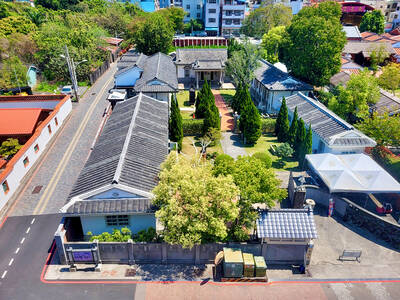
Toward the outside edge of Taichung City, in Wufeng District (霧峰去), sits a sprawling collection of single-story buildings with tiled roofs belonging to the Wufeng Lin (霧峰林家) family, who rose to prominence through success in military, commercial, and artistic endeavors in the 19th century. Most of these buildings have brick walls and tiled roofs in the traditional reddish-brown color, but in the middle is one incongruous property with bright white walls and a black tiled roof: Yipu Garden (頤圃). Purists may scoff at the Japanese-style exterior and its radical departure from the Fujianese architectural style of the surrounding buildings. However, the property